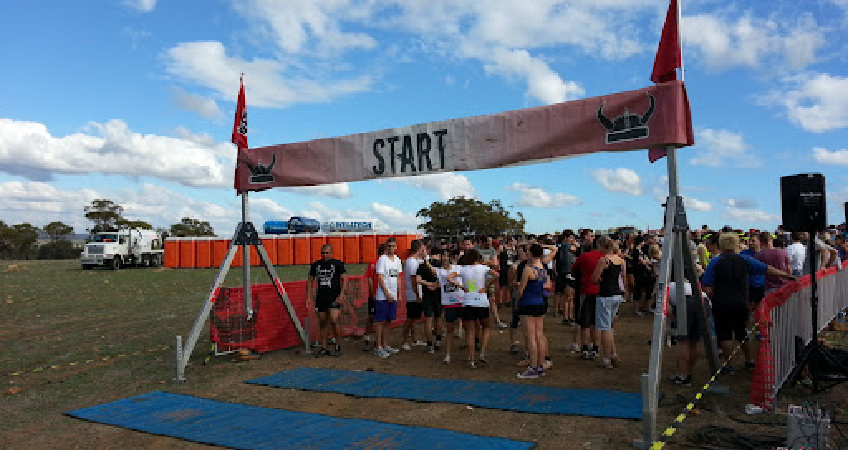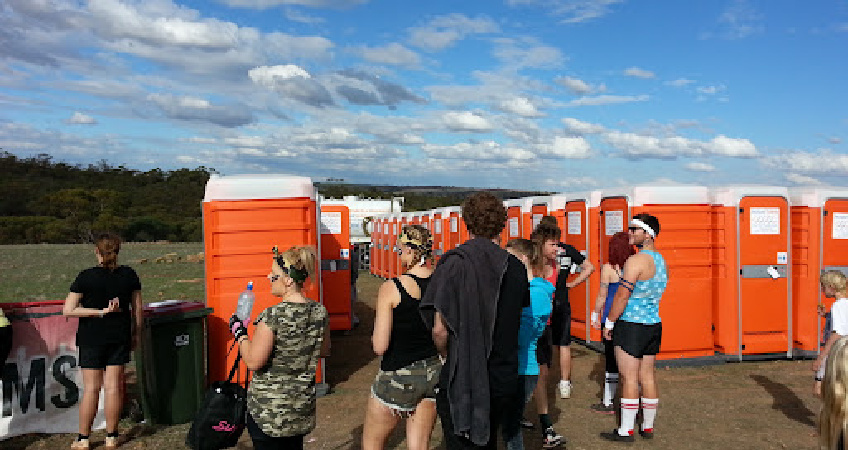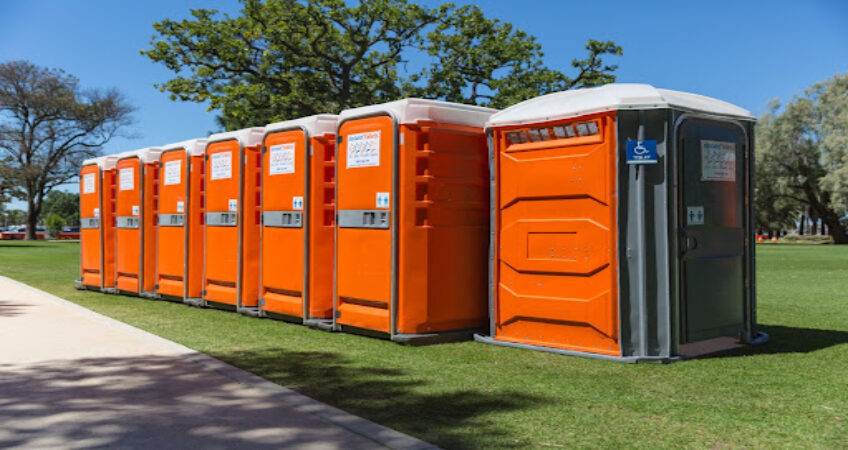Let’s admit it: calculating the optimal number of portable toilets required for an event or construction site can be a bit of a head-scratcher.
From event planners to construction site managers, the challenge is real, but with a clear understanding of the factors involved and some handy guidelines, this daunting task can become a breeze.
Table of Contents
- The role of portable toilets: more than just convenience
- Factors that affect how many portable toilets you’ll need per person
- General guidelines: how many portable toilets per person?
- Need some help deciding how many portable toilets you need per person?
The last thing anyone wants is to be caught in a situation where there are not enough toilets, leading to long queues, discomfort, and even hygiene concerns.
That’s why understanding how many portable toilets you need per person is essential.
The role of portable toilets: more than just convenience
The humble portable toilet plays a pivotal role in ensuring the smooth running of events, construction sites, and other outdoor activities.
It’s not just about convenience – it’s also about dignity, hygiene, and even legal compliance.
Ignoring this essential amenity can lead to an uncomfortable experience for guests, potential health risks, and in some cases, penalties for non-compliance with health and safety regulations.
Factors that affect how many portable toilets you’ll need per person

When determining the number of portable toilets per person, several key factors come into play:
Event or site size
The size of the event or site is a crucial factor in determining the number of portable toilets required.
The scale and magnitude of an event can vary significantly, ranging from intimate gatherings like small wedding receptions to sprawling music festivals that attract thousands of attendees.
Larger events with expansive venues and higher attendance naturally necessitate a greater number of facilities to ensure proper sanitation.
For instance, a music festival that spans multiple stages and zones would require a strategically distributed network of portable toilets to cater to the diverse needs of attendees.
On the other hand, a small wedding reception held in a compact venue may only require a handful of portable toilets to accommodate a relatively limited number of guests.
Assessing the event or site size accurately allows organisers to estimate the adequate quantity and placement of portable toilets, ensuring that attendees have convenient access to sanitary facilities throughout the event.
Duration
The duration of an event or workday is a crucial factor that directly impacts the requirement for portable toilets.
As the event or workday extends in length, the need for restroom facilities increases proportionally.
This is because the longer people remain on-site, the more likely they will need to use the facilities multiple times.
Whether it is a day-long conference, a multi-day music festival, or a construction project spanning several weeks, the duration plays a significant role in determining the number of portable toilets necessary.
Number of attendees and workers
As the number of individuals increases, so does the requirement for restroom access.
Whether it is a large-scale event or a busy worksite, accommodating a greater number of people necessitates providing a higher quantity of portable toilets to meet their hygiene needs.
More attendees or workers lead to increased restroom usage, resulting in potential queues and longer wait times if there are insufficient facilities available.
Additionally, a larger crowd often means a more diverse range of needs, including gender-specific facilities, accessible options, and facilities suitable for families with young children.
Accessibility
It’s essential to consider the needs of individuals with disabilities.
Providing accessible portable toilets that meet accessibility standards is necessary to ensure equal access for all attendees or workers.
Gender distribution
The ratio of males to females can have a significant impact on restroom demand and usage patterns.
Generally, women tend to require more time in restrooms due to physiological factors such as menstrual hygiene needs and the need for additional facilities like changing stations for infants.
As a result, events or worksites with a higher proportion of female attendees or workers may require a greater number of portable toilets to ensure adequate restroom availability and minimise wait times.
Age groups
Different age groups have varying restroom usage patterns.
For example, events catering to families with young children may require additional portable toilets to accommodate diaper changing and childcare needs.
Elderly individuals may need accessible facilities, while events targeting teenagers and young adults may experience higher restroom usage.
Special consideration should also be given to individuals with special needs or disabilities.
Alcohol consumption
Events where alcohol is served typically result in increased restroom usage.
Alcohol consumption can lead to more frequent urination and potentially longer wait times, necessitating a higher number of portable toilets.
Nature of the event
Events that involve physical exertion or sports activities often result in increased restroom demand due to factors such as sweating and higher hydration needs.
Participants engaged in physical activities tend to consume more fluids and may require more frequent restroom breaks to maintain hydration and comfort – which means extra toilets are needed.
Food and beverage service
Events that provide food and beverages may lead to increased restroom usage as people tend to consume more liquids and require restroom visits after meals.
Peak usage times
Consideration should be given to the anticipated peak usage times during the event.
If there are specific intervals when restroom demand is expected to be higher, additional toilets should be provided to prevent long queues and ensure adequate sanitation facilities.
Regulations and guidelines
Local health and safety regulations may specify the minimum requirements for portable toilets based on the type of event, the number of attendees, and other factors.
It is crucial to be familiar with these regulations and guidelines to comply with legal requirements.
The Portable Sanitation Association International (PSAI) recommends guidelines to follow.
General guidelines: how many portable toilets per person?

Here’s a rough guideline to help you figure out how many portable toilet units you might need.
Portable toilets for events
As a rule of thumb, one portable toilet should be provided for every 100 attendees for events lasting up to four hours. For longer events, the number of toilets should be increased.
- If food or drink is served, increase that number by around 30%.
- If more than half of your attendees are female, look at increasing portable toilet numbers.
- For events lasting longer than 6 hours, make sure you’re cleaning regularly – we recommend every 6 hours
See our recommended number of portable toilets for events.
Construction sites
Providing sufficient toilet facilities is crucial for construction sites.
It’s recommended to have one portable toilet unit for every 10 workers, assuming an 8-hour workday.
Compliance with regulations and guidelines specific to the jurisdiction and project is essential. Factors such as project duration, nature of work, proximity to existing restrooms, and accessibility needs should be considered.
Consulting with relevant authorities or industry associations ensures adherence to requirements, promoting worker health and safety.
Private events
For private small events, such as weddings, parties, or family gatherings, the number of portable toilets needed will depend on factors such as the guest count, duration of the event, and available restroom facilities.
As a general guideline, it is recommended to have at least one portable toilet for every 50 people.
However, this can vary based on the event’s specific requirements and the level of comfort desired. If the event location does not have sufficient existing restroom facilities, additional portable toilets should be provided to ensure the convenience and satisfaction of guests.
Special considerations: more than just a loo
Certain events or sites require special considerations.
Accessible toilets are a legal requirement at public events and should be factored into your count.
If your event is family-friendly, consider the addition of baby-changing facilities.
High-end events might demand luxury portable toilets, bringing an element of refinement to the otherwise practical provision.
Events where attendees may get dirty (such as a fun run or colour run) may also need portable showers to ensure guests can remain fresh and clean.
The art of placement and usage
Finding the right balance in the number of portable toilets is key, but so too is their placement.
Toilets should be easily accessible, yet discreetly located. For a crowded concert, it’s a good idea to have facilities dispersed throughout the venue, while an outdoor wedding might prefer them tucked away from the main areas.
Additionally, consider the need for servicing if your event runs over multiple days.
Need some help deciding how many portable toilets you need per person?
With years of experience in providing portable sanitation solutions across Australia, Instant Toilets & Showers is your go-to expert for all things sanitation-related.
We offer a range of portable toilets to suit every need and occasion, from basic models to deluxe units, plus all the additional stuff you’ll need like toilet paper, hand sanitising stations, and more.
Plus, we’re always ready to offer advice and assistance to help you calculate the right number of portable toilets per person.
For those planning an event and in need of reliable portable sanitation solutions, Instant Toilets & Showers offers a wide selection of portable toilets for sale. Whether you’re looking to buy a portable toilet or explore various portable sanitation options, we provide top-quality products and services to ensure your event’s success. Visit us at 18 Rogers Way, Landsdale WA 6065 or contact us at 08 6325 4076 for 24/7 customer support.
Frequently Asked Questions
What factors determine the number of portable toilets needed for an event?
Key factors include the event’s duration, the number of attendees, the presence of food and beverages, alcohol consumption, and whether the conditions are child-friendly or accommodate guests with disabilities.
How many portable toilets are recommended for events?
Generally, one portable toilet is recommended for every 100 attendees for events lasting up to four hours. This number should be adjusted based on specific aspects like duration and food and beverage service.
Are there different types of portable toilets for various needs?
Yes, there are several types of portable toilets, including standard, wheelchair-accessible, luxury/VIP models, and those equipped with baby-changing facilities, to cater to diverse event requirements and user needs.
How does alcohol consumption affect the number of portable toilets required?
Events where alcohol is served typically experience increased restroom usage, necessitating a greater number of portable toilets to accommodate the increased frequency of use.
What are the guidelines for portable toilets on construction sites?
It’s recommended to have one portable toilet unit for every 10 workers, assuming an 8-hour workday. This ensures compliance with health and safety standards and meets the needs of the workforce.

Managing Director at Instant Sea Containers
Scott Rawson is the Managing Director of Instant Products Group, a specialist group of companies that offer portable building solutions, including sea containers, transportable offices, and portable sanitation products. With more than 20 years of experience in various management positions and a finalist in the WA Business News 40 under 40 awards in 2013, Scott is a highly motivated entrepreneur that has a passion for designing products to suit the needs of individual markets. From the creation of Instant Products Group over 20 years ago, he has successfully grown the group into a multi-million dollar corporation and his success is widely recognised in Western Australia. Scott is dedicated to expanding Instant Products Group nationally and providing high-quality products to a range of sectors, including mining, engineering, property development, and government.

